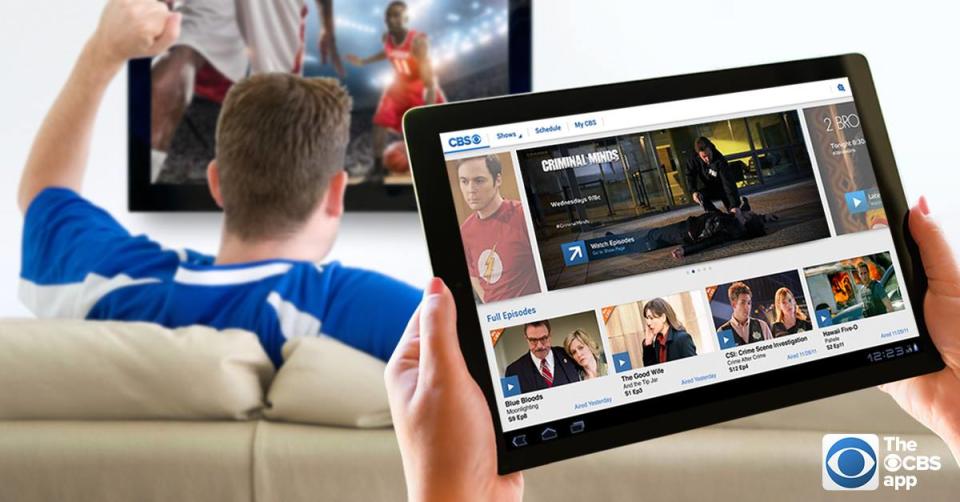CBS Thinks New Streaming Competition Will Help It Grow
CBS (NYSE: CBS) has been offering a direct-to-consumer service to its fans for years, while competitors like Disney (NYSE: DIS), AT&T's (NYSE: T) WarnerMedia, and Comcast's (NASDAQ: CMCSA) NBCUniversal are just getting started. The media company launched CBS All Access in 2014, and it's since grown to a respectable 4 million subscribers. CBS also has about 4 million subscribers for its over-the-top Showtime service, which launched mid-2015.
Marc DeBevoise, president and chief operating officer at CBS Interactive, thinks the influx of competition from Disney, WarnerMedia, and others will help grow its subscribers rather than steal subscribers away. He sees the average consumer moving from just three over-the-top subscriptions today to as many as 10 at some point in the future, he told AdAge.

Image source: CBS.
A la carte cable is here
The average pay-TV bill in the United States is $107 per month. As more streaming services enter the market, it could accelerate cord-cutting as consumers ditch their pay-TV bundle to put together a bundle of their own. Adding eight or nine additional streaming services and ditching cable could provide a better entertainment package than cable at a better price.
The top reason millennials say they cut the cord on cable is they get enough entertainment from their available streaming options. It becomes increasingly difficult for consumers to justify a $100 monthly bill when there's a bounty of streaming options available to them. Indeed, about one-third of Americans said they expect to increase their total digital subscriptions over the next couple years, according to a recent survey from The Harris Poll and Zuora.
Subscribing to the top eight services on Parks & Associates list of top 10 streaming services in addition to Disney+ and ESPN+ would cost a total of just $92 per month. Savvy consumers could save more through bundling, full-year commitments, and other discounts. And the savviest could save more by cycling through services as they watch them since direct-to-consumer services don't tie consumers down to contracts like pay-TV providers do.
With more consumer choice, a service like CBS All Access may find its addressable market expand. The service is surprisingly popular with cord-cutters since it offers a live stream of CBS' broadcast network. Management notes upticks in subscriptions around big broadcast events such as the Super Bowl and the Grammy Awards. That's despite the fact that most households can receive CBS free with an over-the-air antenna.
Winners and losers
CBS is one of the few media companies positioned to benefit from an increase in cord-cutting. Not only does it have a strong position in premium subscription video on demand, it also has several ad-supported video platforms.
Most importantly, it has limited exposure to the pay-TV ecosystem, as it only operates a few cable networks. By comparison, Disney is heavily reliant on cable TV, as its networks command some of the highest affiliate fees in the industry.
Meanwhile, nearly all of WarnerMedia's networks are exclusively available through cable TV (it owns half of the CW). NBCUniversal is also heavily reliant on pay-TV networks. Not to mention their parent companies combine to account for about half of pay-TV subscriptions in the United States.
Disney, WarnerMedia, and NBCUniversal are using streaming to cannibalize themselves -- a necessary tactic as more competition enters the market.
If DeBevoise's prediction comes true, and consumers have around 10 streaming services each, another winner will be the aggregating platforms. Services that can organize content and billing for consumers will find a massive increase in users as more video entertainment moves to streaming.
The forthcoming competition doesn't scare CBS, and it shouldn't scare other competitors in the streaming video market with limited exposure to the existing pay-TV ecosystem.
More From The Motley Fool
Adam Levy has no position in any of the stocks mentioned. The Motley Fool owns shares of and recommends Walt Disney and ZUO. The Motley Fool is short shares of CBS. The Motley Fool recommends Comcast. The Motley Fool has a disclosure policy.

 Yahoo Finance
Yahoo Finance 